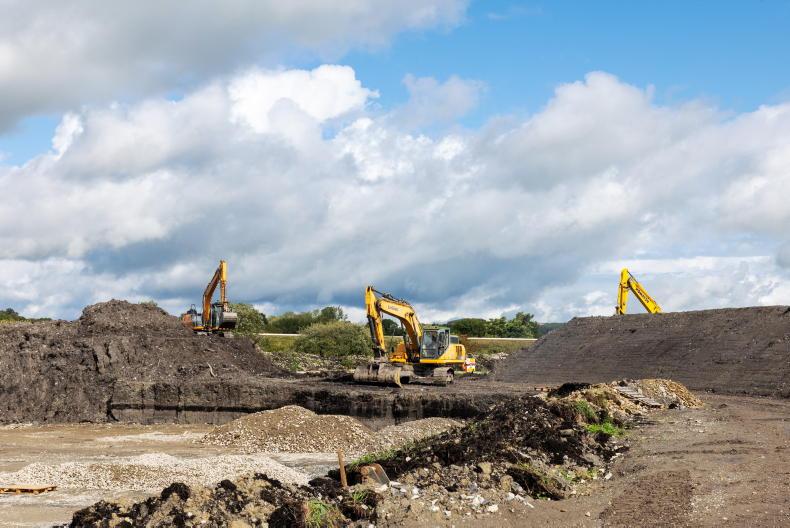Nearly six years after setting its initial target for developing the anaerobic digestion (AD) sector in Ireland, the Government continues to struggle to establish a clear strategy to get it off the ground.
Among the many challenges anticipated when setting up this industry, few likely expected hydrotreated vegetable oil (HVO) to emerge as one of the most significant.
While the AD industry may have been vocal about this challenge, it’s taken the demise of one of Ireland’s pioneering AD businesses to bring it to national attention.
News broke last week that Green Generation, Ireland’s first AD plant to produce biomethane gas and inject it into the national gas grid, has gone into receivership.
The company, run by farmer and businessman Billy Costello, sold biomethane to the transport industry to help meet its renewable blending obligation under the Renewable Transport Fuel Obligation (RTFO).
However, the company has faced significant pressure due to the increasing volume of hydrotreated vegetable oil (HVO) imports, which can also be used to meet the obligation.
This influx of HVO into the market at significantly lower and more competitive prices than biomethane meant that Green Generation could no longer sustain its business model.
KPMG has now been appointed as receivers for the company which is part owned by Irish biofuels company ClonBio Group, and has received funding from the Irish Strategic Investment Fund.
HVO, also known as ‘renewable diesel’, is produced through catalytic hydroprocessing of oils and fats.
The use of HVO in Ireland has increased dramatically over the past four years, as it acts as an easy, direct replacement for diesel, but claims to reduce emissions by up to 90%. It could account for over 30% of biofuel used in Ireland in 2025, up from virtually zero in 2021.
HVO is largely produced from used cooking oil and palm oil mill effluent. However, concerns have been raised that much of the imported HVO is actually produced from non-sustainable sources, such as virgin palm oil, and fraudulently labelled as coming from used cooking oil and palm oil mill effluent.
Competition
Speaking to the Irish Farmers Journal, Billy Costello explained that imported HVO receives the same number of certificates as indigenous biomethane gas – 2.5 certs. These certificates are then bought by companies to meet their RTFO obligation. In 2022, these certs were worth 14c/kWh, plus the price of natural gas for his biomethane. Today, the certs are valued at just 5.5c/kWh.
While the amount of gas which could be supplied to the transport market is currently relatively small, a similar obligation scheme, called the Renewable Obligation Scheme (RHO) is being introduced for the heat sector. This will be the Government’s main policy to support the AD sector, expecting to create a market for biomethane.

There are concerns that HVO could also be used to meet a new obligation for the heat sector
However, in the absence of any details from the Government, it appears as though HVO will also be an eligible fuel for the RHO, and threatens to end the AD sector before it has even really begun.
Action on fraud
Commenting on the news, Seán Finan CEO of the Irish Bioenergy Association (IrBEA) said he was gravely concerned and distressed to hear that Green Generation had gone into receivership.
He said that IrBEA and its bioliquid and biomethane members have very strongly highlighted the issue of fraudulent activities in the non-EU biofuel supply chain and the detrimental impact this is having on business including Irish bioliquid and biomethane producers.

Biomethane gas could struggle ot compete with HVO.
Finan said: “Over the last few years, IrBEA and its members have encountered a reluctance by Government and the broader fossil fuel industry to even admit that there is a problem.
“To make matters worse, and despite stringent opposition from IrBEA bioliquid and biomethane members, in 2023, the Government proceeded to give non-EU biofuel additional renewable energy certificates which has completely distorted the biofuel market to the detriment of Irish producers,” he said.
Finan continued: “The Government needs to immediately remove eligibility of fraudulent non-EU biofuels to fulfil compliancy requirement in the RTFO scheme and also in the proposed RHO scheme.”
Developer reaction
Irish AD developer, Declan Murray, CEO of Biocore Environmental, said that the appointment of a receiver to Green Generation was of great concern for the Irish industry.
In a statement to the Irish Farmers Journal, he said, “it is clear that the [biomethane] market has been destroyed by the importation of falsified palm oil masquerading as a renewable product. Not alone must renewable gas compete with this product, it is currently in receipt of State support through a carbon credit multiplier.

HVO is a drop in fuel and has increased in use in Ireland over the past number of years.
“This product is, as we write, either banned or severely restricted throughout Europe, and unless we do the same, no renewable gas industry will grow in Ireland,” he continued.
Government response
In a statement to the Irish Farmers Journal, a spokesperson for the Department of Environment, Climate and Communications said: “The National Oil Reserves Agency (NORA), as the competent authority in Ireland for renewable transport fuels, provides ongoing assurance on the sustainability of the current supply of biofuel to Ireland under the Renewable Transport Fuel Obligation.
“In light of analysis by the NORA indicating concerns of possible biofuel fraud risk in global supply of palm oil mill effluent (POME), the NORA has recommended that it is appropriate at this time to remove national incentives under the Renewable Transport Fuel Obligation for POME-derived biofuel products.
“The Minister for Transport has therefore approved the commencement on 27 February of a statutory consultation process for draft regulations to exclude POME from the award of additional RTFO certificates under the National Oil Reserves Agency Act 2007 (Additional Certificates for Renewable Transport Fuel) Regulations 2023 (S.I. No. 143 of 2023)”.
Costello argued that the consultation on reducing the number of certs HVO can receive from 2.5 to 2 doesn’t go far enough however, and it should not receive any certs at all.
Future of AD
Currently, it does look likely that the RHO will permit the use of HVO, which will likely cause problems for the AD sector, leading to calls for a rethink on the State’s AD strategy.
IFA Energy for Farms Project team chair Frank Brady is calling on the Government to conduct an urgent review of their biomethane and AD policy. “It is becoming clear that the Government’s plans for the roll out of AD are underfunded and not properly thought out. Now one of the few operating AD plants in the country is gone into receivership,” he said.
“We need to see an urgent review of policy, with proper supports in place to get the sector up and running,” he said.
“This latest closure will certainly leave potential investors reluctant to develop AD plants. Swift action and meaningful engagement between relevant Government departments is required,” he concluded.
In short
HVO is a drop in replacement fuel for diesel vehicles, and claims a 90% reduction in emissions. The fuel can be used by transport and fuel companies to meet a legal renewables obligation. The fuel is considerably more competitive than biomethane, collapsing the market for biomethane in the transport sector. There are concerns that HVO could also be used to meet a new obligation for the heat sector, intended to be the main policy to support a new AD sector.
Nearly six years after setting its initial target for developing the anaerobic digestion (AD) sector in Ireland, the Government continues to struggle to establish a clear strategy to get it off the ground.
Among the many challenges anticipated when setting up this industry, few likely expected hydrotreated vegetable oil (HVO) to emerge as one of the most significant.
While the AD industry may have been vocal about this challenge, it’s taken the demise of one of Ireland’s pioneering AD businesses to bring it to national attention.
News broke last week that Green Generation, Ireland’s first AD plant to produce biomethane gas and inject it into the national gas grid, has gone into receivership.
The company, run by farmer and businessman Billy Costello, sold biomethane to the transport industry to help meet its renewable blending obligation under the Renewable Transport Fuel Obligation (RTFO).
However, the company has faced significant pressure due to the increasing volume of hydrotreated vegetable oil (HVO) imports, which can also be used to meet the obligation.
This influx of HVO into the market at significantly lower and more competitive prices than biomethane meant that Green Generation could no longer sustain its business model.
KPMG has now been appointed as receivers for the company which is part owned by Irish biofuels company ClonBio Group, and has received funding from the Irish Strategic Investment Fund.
HVO, also known as ‘renewable diesel’, is produced through catalytic hydroprocessing of oils and fats.
The use of HVO in Ireland has increased dramatically over the past four years, as it acts as an easy, direct replacement for diesel, but claims to reduce emissions by up to 90%. It could account for over 30% of biofuel used in Ireland in 2025, up from virtually zero in 2021.
HVO is largely produced from used cooking oil and palm oil mill effluent. However, concerns have been raised that much of the imported HVO is actually produced from non-sustainable sources, such as virgin palm oil, and fraudulently labelled as coming from used cooking oil and palm oil mill effluent.
Competition
Speaking to the Irish Farmers Journal, Billy Costello explained that imported HVO receives the same number of certificates as indigenous biomethane gas – 2.5 certs. These certificates are then bought by companies to meet their RTFO obligation. In 2022, these certs were worth 14c/kWh, plus the price of natural gas for his biomethane. Today, the certs are valued at just 5.5c/kWh.
While the amount of gas which could be supplied to the transport market is currently relatively small, a similar obligation scheme, called the Renewable Obligation Scheme (RHO) is being introduced for the heat sector. This will be the Government’s main policy to support the AD sector, expecting to create a market for biomethane.

There are concerns that HVO could also be used to meet a new obligation for the heat sector
However, in the absence of any details from the Government, it appears as though HVO will also be an eligible fuel for the RHO, and threatens to end the AD sector before it has even really begun.
Action on fraud
Commenting on the news, Seán Finan CEO of the Irish Bioenergy Association (IrBEA) said he was gravely concerned and distressed to hear that Green Generation had gone into receivership.
He said that IrBEA and its bioliquid and biomethane members have very strongly highlighted the issue of fraudulent activities in the non-EU biofuel supply chain and the detrimental impact this is having on business including Irish bioliquid and biomethane producers.

Biomethane gas could struggle ot compete with HVO.
Finan said: “Over the last few years, IrBEA and its members have encountered a reluctance by Government and the broader fossil fuel industry to even admit that there is a problem.
“To make matters worse, and despite stringent opposition from IrBEA bioliquid and biomethane members, in 2023, the Government proceeded to give non-EU biofuel additional renewable energy certificates which has completely distorted the biofuel market to the detriment of Irish producers,” he said.
Finan continued: “The Government needs to immediately remove eligibility of fraudulent non-EU biofuels to fulfil compliancy requirement in the RTFO scheme and also in the proposed RHO scheme.”
Developer reaction
Irish AD developer, Declan Murray, CEO of Biocore Environmental, said that the appointment of a receiver to Green Generation was of great concern for the Irish industry.
In a statement to the Irish Farmers Journal, he said, “it is clear that the [biomethane] market has been destroyed by the importation of falsified palm oil masquerading as a renewable product. Not alone must renewable gas compete with this product, it is currently in receipt of State support through a carbon credit multiplier.

HVO is a drop in fuel and has increased in use in Ireland over the past number of years.
“This product is, as we write, either banned or severely restricted throughout Europe, and unless we do the same, no renewable gas industry will grow in Ireland,” he continued.
Government response
In a statement to the Irish Farmers Journal, a spokesperson for the Department of Environment, Climate and Communications said: “The National Oil Reserves Agency (NORA), as the competent authority in Ireland for renewable transport fuels, provides ongoing assurance on the sustainability of the current supply of biofuel to Ireland under the Renewable Transport Fuel Obligation.
“In light of analysis by the NORA indicating concerns of possible biofuel fraud risk in global supply of palm oil mill effluent (POME), the NORA has recommended that it is appropriate at this time to remove national incentives under the Renewable Transport Fuel Obligation for POME-derived biofuel products.
“The Minister for Transport has therefore approved the commencement on 27 February of a statutory consultation process for draft regulations to exclude POME from the award of additional RTFO certificates under the National Oil Reserves Agency Act 2007 (Additional Certificates for Renewable Transport Fuel) Regulations 2023 (S.I. No. 143 of 2023)”.
Costello argued that the consultation on reducing the number of certs HVO can receive from 2.5 to 2 doesn’t go far enough however, and it should not receive any certs at all.
Future of AD
Currently, it does look likely that the RHO will permit the use of HVO, which will likely cause problems for the AD sector, leading to calls for a rethink on the State’s AD strategy.
IFA Energy for Farms Project team chair Frank Brady is calling on the Government to conduct an urgent review of their biomethane and AD policy. “It is becoming clear that the Government’s plans for the roll out of AD are underfunded and not properly thought out. Now one of the few operating AD plants in the country is gone into receivership,” he said.
“We need to see an urgent review of policy, with proper supports in place to get the sector up and running,” he said.
“This latest closure will certainly leave potential investors reluctant to develop AD plants. Swift action and meaningful engagement between relevant Government departments is required,” he concluded.
In short
HVO is a drop in replacement fuel for diesel vehicles, and claims a 90% reduction in emissions. The fuel can be used by transport and fuel companies to meet a legal renewables obligation. The fuel is considerably more competitive than biomethane, collapsing the market for biomethane in the transport sector. There are concerns that HVO could also be used to meet a new obligation for the heat sector, intended to be the main policy to support a new AD sector. 












SHARING OPTIONS